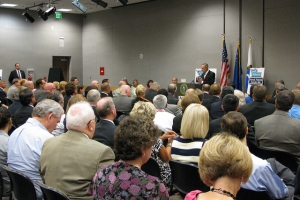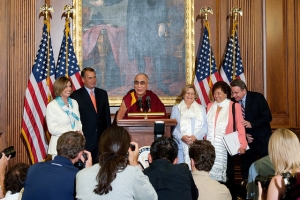Support migrant centric journalism today and donate

President Obama has attempted to keep up pressure on Congressional opponents of immigration reform by making the economic case for reform. The President told the country that the immigration reform bill passed by the Senate in June would add $1.4trillion to the US economy in the next 20 years.
The bill will only become law if it is also passed by the lower house of Congress, the House of Representatives, with at least 60% support. The House of Representatives (known as 'the House') is controlled by Republicans and many Republican Representatives are opposed to the current bill because it proposes a 'pathway to citizenship' for many of the 11.5m illegal immigrants currently living in the US.
The President promised to make comprehensive immigration reform a priority in his second term and so is attempting to pressurise the House to pass the bill. He said that Congress has been debating the matter for more than a decade and must act now. The last time a similar bill was introduced was in 2006 under President Bush but this too failed to become law.
'Foreign companies are more likely to invest' in the US after reform – Obama
The President used his weekly address to the nation on Saturday 13th July to say that 'immigration reform would make it easier for highly skilled immigrants and those who study at our colleges and universities to start businesses and create jobs right here in America'. He said that 'foreign companies are more likely to invest here. The demand for goods and services would go up creating more jobs for American workers'.He added that additional tax revenue, largely paid by the former illegal immigrants who would pay taxes once they were able to work legally, would enable the government to reduce the US budget deficit by up to $850bn over 20 years.
It is unlikely, however, that these economic arguments will have very much effect on the hard core opponents of the bill. For them, it is the creation of 'a pathway to citizenship' for illegal immigrants that makes the bill so offensive.
Pathway to citizenship would reward criminality
Many Republicans say that to grant citizenship to illegal immigrants would be to reward criminal behaviour.After a meeting of House Republicans last week, it became clear that a vote in the House is now unlikely before September. Until it happens, supporters of reform will intensify their lobbying campaign. They believe that they successfully lobbied Republicans in the Senate to support the bill at the Senate's vote on 28th June 2013.
The current bill is called the Border Security, Economic Opportunity and Immigration Modernization Act 2013. It seeks to totally upgrade the US immigration system which politicians of all parties agree is failing the country.
Main points of proposed law
If the Act becomes law- Spending on border security along the Mexican/US border would be massively increased
- A 'pathway to citizenship' would be established for most of the 11.5m illegal immigrants living in the US. They would have to pay $500 fine for illegally immigrating, pay back taxes, learn English and wait for at least ten years before they could acquire citizenship.
- The number of H-1B 'specialty occupation' visas granted to Bachelor's degree students would rise immediately from 65,000 to 130,000 per year and could rise to 180,000 in times of high demand. The cap on H-1B visas for PhD and Doctorate students, currently set at 20,000, would be removed altogether.
- Graduates of US universities with doctorates and PhD degrees would be able to apply for US permanent resident visas (or 'green cards'). There would be no cap on the number of applications allowed.
- US businesses would be required to check all new employees against the E-Verify computer system to check that they are entitled to work in the US.
- There would be a new 'w-visa' for unskilled workers in agriculture and construction.





















